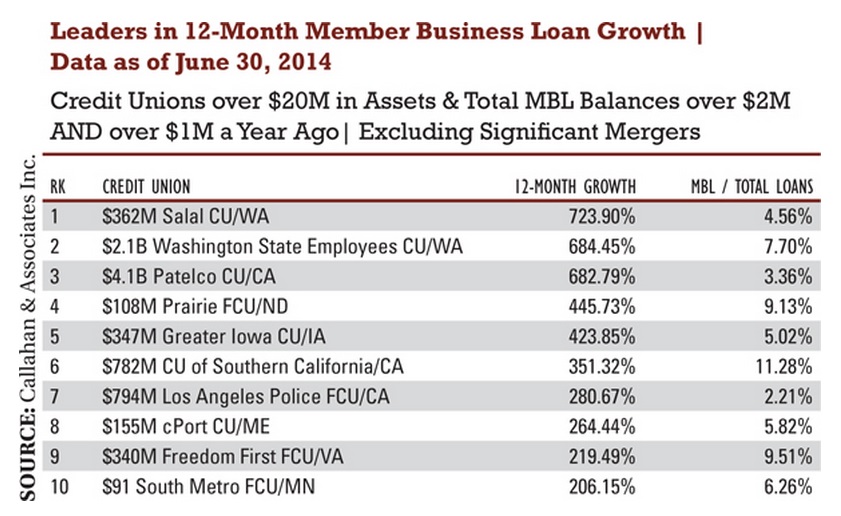Despite ongoing yet stalled efforts to raise the member business lending cap, credit unions with established loan programs and those new to the channel managed to grow their portfolios in an environment still recovering from the last economic downturn.
The $370 million Salal Credit Union in Seattle grew its MBLs by 724% between June 2013 and June 2014 and secured just over $12 million dollars in business loans or about 4.56% of its assets, according to data analyzed by Callahan & Associates for CU Times.
The 34,000-member cooperative ranked first among the top 10 credit union leaders in MBL growth for the period tracked. Click through to page 2 to see the list.
Salal CFO Robert Schweigert attributed some of the credit union's MBL progress to the program's relatively recent launch. He said while growth off a zero baseline will seem large, the types of loans Salal offered helped to hike balances.
In addition to commercial real estate loans, the credit union's program included general business loans and short-term, one-payment business loans. However, most of Salal's early loans went to support CRE deals, Schweigert said. At that time, the credit union felt more comfortable engaging in what some experts have deemed as riskier and more complex transactions.
Since Salal established a financing program for home loans, the credit union had experience with property valuation and appraisal. The properties secured the CRE loans and as a result, the loans carried less risk than other business loans, Schweigert said.
Salal was chartered in 1948 to serve doctors working for the Group Health Cooperative in the Seattle area, Schweigert said. In 2010, the financial institution changed its name from Group Health Credit Union to its current moniker after expanding to a statewide field of membership.
Schweigert said the cooperative still wanted a new name that would keep the link to the health care industry.
“Salal is a kind of well-known shrub or plant here in Washington state that gets used in flower arrangements but also has medicinal and healing properties,” he explained. “So, the name resonated with us and with our members.”
Read more: Obamacare and medical marijuana create MBL opportunities …
 That connection carried over into Salal's business lending and business services programs because the credit union anticipated shifts in the medical field brought on by the Patient Protection and Affordable Care Act signed into law in 2010, according to Schweigert. The industry's reforms were expected to create MBL opportunities in the medical industry.
That connection carried over into Salal's business lending and business services programs because the credit union anticipated shifts in the medical field brought on by the Patient Protection and Affordable Care Act signed into law in 2010, according to Schweigert. The industry's reforms were expected to create MBL opportunities in the medical industry.
Salal also expected steady growth in its commercial loan business from growing demand for financing from the medical cannabis industry.
“The one thing about cultivating cannabis indoors is that it is very space intensive,” Schweigert said. “The increased need for properly zoned warehouse space to use for cannabis businesses has already started tightening up prices for that real estate.”
Helping to finance cutting-edge medical marijuana businesses felt like a natural extension of the credit union's long-standing link to the health care industry, Schweigert said.
Roughly 61 miles south of Salal's headquarters in Seattle was home to another Washington credit union among those that led the industry in MBL growth.
The $2.1 billion Washington State Employees Credit Union in Olympia grew its MBLs 684% between June 2013 and June 2104 with outstanding business loans worth $122 million, according to the CU Times ranking. The 216,000-member cooperative placed second in the MBL growth category for the period tracked.
Kevin Foster-Keddie, WSECU president/CEO, said commercial lending also played a pivotal role.
Since 2008, the credit union had business lending on its agenda when WSECU hired a seasoned business lending executive to help get the effort under way, Foster-Keddie noted.
However, the crush of the Great Recession prevented any efforts from moving forward.
In 2012, interest started to pick back up as the downturn waned and WSECU began offering more business services, he added. The credit union also launched commercial loans when it became aware of a need among its members who wanted to invest as property owners, Foster-Keddie recalled.
“In this region, the housing dynamics have really come to favor rental property,” he said.
Members sought to supplement income by taking advantage of steady housing demand brought on by the region's economy and popularity, according to Foster-Keddie.
Many of WSECU's initial business loans either financed the purchase of renter-occupied properties or the member was going to convert them into rental housing. Foster-Keddie said the credit union felt comfortable with these loans because most were 10-year adjustable rate loans secured by the properties.
The credit union also offered CRE loans by either financing the purchase or refinancing the existing loans on retail, office and warehouse spaces. According to the credit union's website, WSECU limited its CRE lending to 80% of the property value.
Foster-Keddie said rent property transactions were focused on residential properties, not financing apartment buildings or multi-family buildings. The dynamics and exposure with those kinds of loans kept WSECU from engaging in the transactions.
© 2025 ALM Global, LLC, All Rights Reserved. Request academic re-use from www.copyright.com. All other uses, submit a request to [email protected]. For more information visit Asset & Logo Licensing.






